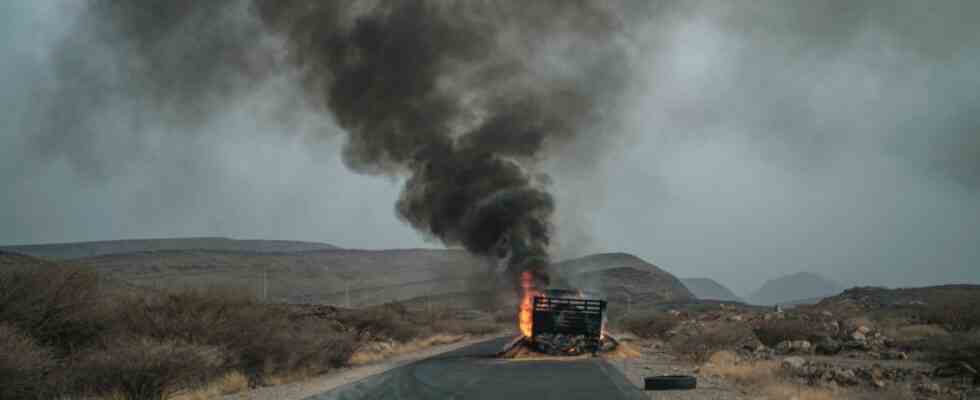Dejen Mezgebe is standing in the office of the Tigray Independence Party, behind him a small partition with the party’s logo, in the adjoining rooms there are deserted desks and empty bookshelves. It doesn’t seem like many people have stopped by here in the past few months. “I was in the bush,” says Dejen, referring to the civil war in the Tigray region in northern Ethiopia, which began in November 2020 and lasted almost two years. A fragile peace has reigned for a few weeks, after around 18 months of brutal blockades, Tigray has internet access again, the airport is open and humanitarian aid is arriving.
It is a slow awakening from the almost total darkness. One thinks of those who may not be there anymore, like one of Dejen’s sons who is still missing at the front. But also of the future, about what the prospects might be for Tigray and its battered population.
Dejen Mezgebe says he sees no other way than independence. Ethiopia is a multi-ethnic country with more than 110 million people and 80 ethnic groups. The Tigray make up around six percent, but a small elite of the Tigray People’s Liberation Front (TPLF) dominated politics and business throughout Ethiopia for decades, until 2018 when the new prime minister, Abiy Ahmed, from the largest ethnic group, the Oromo, came into office. He wanted to curtail the power of the regions, the TPLF sabotaged his policies, and the conflict escalated to the point of civil war.
The region has probably been thrown back decades
The question now is what long-term peace should look like after all the violence, after perhaps up to 600,000 dead?
“We still haven’t found any words for what was done to us,” says Dejen, his main job is a law professor at the University of Mekele, which has been closed for two years and has also been damaged by attacks by the Ethiopian federal army. The region may have been thrown back decades, says Dejen. “A conflict like this comes up every thirty years, so it’s enough now, it’s time to go our own way,” says Dejen. He sees Ethiopia as a failure as a multi-ethnic state because different ethnic groups have failed to develop a common identity, a vision for the future.
It’s a view shared by many in Tigray. But not the TPLF, which wants to remain part of Ethiopia. “She’s only fighting for her own power,” says Dejen. He and his party, on the other hand, want independence, democracy, a free press and an end to the informer system. The TPLF has its people down to the smallest village, one for every six residents who denounces dissenters and possibly also decides who gets part of the international aid that is now slowly flowing into the country.
“The TPLF cannot be reformed”
“The TPLF cannot be reformed,” says Dejen. He wants to beat her in the next elections, for which there is no date yet. Various local media reports that the TPLF will initially lead an interim government, of which only two representatives of the opposition parties will be represented among the 23 members. The others come from the military and the diaspora. It doesn’t sound like departure.
And even if it should be decided at the ballot box how things will continue in Tigray: Tedros Gebreabzgi doesn’t believe that the future will get any better. “I will leave Tigray, there is no future here,” he says. He is 25 years old and before the war he had just gotten a job at the university as a lecturer in the Faculty of Architecture. The university is still closed, he sees his future blocked.
His mother had once fought with the TPLF herself, against a communist regime that claimed hundreds of thousands of lives in Ethiopia after the fall of Emperor Haile Selassie in 1974. He says he respects the TPLF’s historic achievement but doesn’t believe it can point the way to a bright future. Too authoritarian, too corrupt, too yesterday. Still, many could not imagine voting for anything other than the liberators of yesteryear.
“In many areas we are still stuck in the past,” says Tedros. So many farmers are so strict followers of the Orthodox Church that they spend almost half the month observing various holidays instead of being in the fields. Tedros wants democracy and opportunities. And don’t think you’ll find her in Tigray. He wants to go to the capital Addis Ababa and from there abroad to study environmental technology. But for now he’s stuck in Tigray because the Abiy government doesn’t allow men between the ages of 18 and 65 to leave the region, and there was no justification. Mekele is still a kind of prison.
The TPLF has not yet spoken publicly about preventing the departure, which contradicts all peace agreements. It may even be in their interests because the party is afraid that the educated and motivated will look elsewhere for opportunities. The flights from Mekele to the capital Addis Ababa are fully booked for weeks, but not in the opposite direction.

